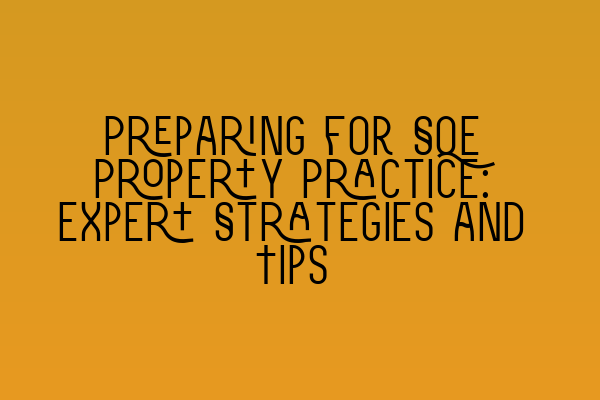Preparing for SQE Property Practice: Expert Strategies and Tips
Are you ready to take on the challenge of property law practice? As a solicitor, it is vital to be well-versed in property law and land law to effectively serve your clients. The Solicitors Qualifying Examination (SQE) is designed to assess your knowledge and skills in these areas, and it is important to be prepared.
In this blog post, we will provide you with expert strategies and tips to help you prepare for SQE Property Practice. We understand that the SQE is a comprehensive exam, and our goal is to help you succeed by sharing valuable insights and guidance.
1. Study the Foundations:
To build a solid understanding of property law and land law, it is crucial to study and comprehend the foundations of these subjects. Start by familiarizing yourself with the key concepts, principles, and legal frameworks that govern property transactions. This will provide you with a strong foundation on which to build your knowledge.
2. Practice Makes Perfect:
In addition to studying the theory, it is essential to practice applying your knowledge in practical scenarios. Utilize interactive SQE mock tests for property law to test your understanding and identify areas for improvement. These mock tests will simulate real-life scenarios, allowing you to gain practical experience and confidence in your abilities.
3. Stay Updated with Property Law Reforms:
To excel in property law practice, it is crucial to stay updated with the latest legal developments and reforms. The legal landscape is constantly evolving, and it is essential to be aware of any changes that may impact your clients’ interests. Stay informed through regular reading of industry publications, attending webinars, and seeking expert insights and guidance.
4. Understand the Parties’ Rights and Responsibilities:
A key aspect of property law practice is understanding the rights and responsibilities of the parties involved in a property transaction. Whether you represent the buyer, seller, or other stakeholders, it is important to comprehend their respective rights and obligations. This knowledge will enable you to provide comprehensive and effective legal advice to your clients.
To enhance your understanding, we recommend reading our article on “Parties in a Contract: Rights and Responsibilities.” This article provides valuable insights into the legal rights and responsibilities of the parties involved in property transactions.
5. Grasp the Concept of Contractual Capacity:
Contractual capacity is a critical aspect of property transactions. It determines the legal capacity of individuals to enter into a contract, sell or purchase property, and make legally binding agreements. Understanding contractual capacity is essential in ensuring the validity and enforceability of property transactions.
To expand your knowledge on this topic, we encourage you to read our article on “Understanding Contractual Capacity: Rights and Limitations.” This article delves into the concept of contractual capacity, its limitations, and the rights of individuals within the bounds of the law.
6. Attend our SQE Property Law Webinars:
To further enhance your understanding of property law and land law, we invite you to join our SQE Property Law webinars. These webinars are designed to provide you with expert insights and guidance on the most important topics and exam techniques. Our experienced professionals will share their knowledge and answer your questions, helping you excel in your SQE preparation.
For more information and registration, click here: “Join Our SQE Property Law Webinars: Expert Insights and Guidance.”
7. Master the Art of Legal Writing:
In property law practice, effective and concise legal writing is essential. Develop your legal writing skills by practicing writing memos, case summaries, and legal opinions. Focus on clarity, logical flow of arguments, and use of appropriate legal terminology. A well-written document not only demonstrates your expertise but also enhances your clients’ understanding and confidence in your abilities.
8. Utilize SEO Strategies for Online Presence:
As a solicitor, building an online presence is crucial for your professional growth. Ensure that your website and online content are search engine optimized (SEO) to increase your visibility among potential clients. Incorporate relevant keywords, such as “SQE Property Practice,” “property law exam preparation,” and “Solicitors Qualifying Examination” in your website and blog content.
9. Invest in a Professional SQE Property Practice Course:
To fully prepare for the SQE exam, consider investing in a reputable and comprehensive SQE Property Practice course. Such a course will provide you with specialized training, exam techniques, and practice materials specifically tailored to the requirements of the SQE exam. This focused approach will significantly enhance your chances of success.
In conclusion, preparing for SQE Property Practice requires a combination of foundational knowledge, practical application, staying updated with reforms, understanding the parties’ rights and responsibilities, and improving your legal writing skills. By incorporating these expert strategies and tips into your preparation, you will be well-equipped to tackle the SQE exam with confidence.
Remember to continuously seek out resources, attend webinars, and practice interactive mock tests to enhance your understanding and application of property law. By doing so, you will be on the path to becoming a successful property law practitioner.
For further insights on property law reforms and recent changes, we recommend reading our article on “Contract Law Reforms: An Analysis of Recent Changes.” This article will keep you informed about the latest updates and their implications in property law practice.
Best of luck with your SQE preparation, and remember that preparation is the key to success in property law practice!
